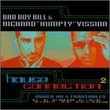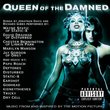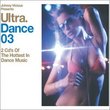| All Artists: Eugene Ysaye, Thomas Zehetmair Title: Sonatas for Solo Violin Members Wishing: 1 Total Copies: 0 Label: ECM Records Original Release Date: 1/1/2004 Re-Release Date: 9/28/2004 Genre: Classical Styles: Chamber Music, Historical Periods, Classical (c.1770-1830), Instruments, Strings Number of Discs: 1 SwapaCD Credits: 1 UPCs: 028947268727, 289472687272 |
Search - Eugene Ysaye, Thomas Zehetmair :: Sonatas for Solo Violin
 | Eugene Ysaye, Thomas Zehetmair Sonatas for Solo Violin Genre: Classical
This is a stunning performance of some of the most formidably difficult music in the repertoire. Written by the foremost violinist of his, and perhaps any other time, these six sonatas contain every imaginable--and some un... more » |
Larger Image |
CD DetailsSynopsis
Amazon.com This is a stunning performance of some of the most formidably difficult music in the repertoire. Written by the foremost violinist of his, and perhaps any other time, these six sonatas contain every imaginable--and some unimaginable--technical, tonal, and musical challenge for the instrument and the player. Ysaÿe's acknowledged models were Bach and Paganini, his inspiration six friends and colleagues whose playing he especially admired and to each of whom a sonata is dedicated, tailored to his instrumental and interpretive gifts. The one written for Kreisler even incorporates a little pastiche of his composing style. Although Ysaÿe had stopped performing, he poured into these sonatas his peerless knowledge of the violin and its resources, along with his lifelong experience of it as an expressive tool, creating what is widely regarded by both players and listeners as a set of masterpieces. Clearly, only a virtuoso of the highest caliber as well as intrepid courage can do justice to these works. Thomas Zehetmair has established an international reputation for his consummate technique, stylistic versatility, fiery temperament, emotional intensity, and adventurous spirit. These qualities are on abundant display on this recording, making him an ideal interpreter for these highly charged, powerful, dramatic, mercurial works for which he seems to have a natural affinity. He tosses off the most hair-raising technical feats with effortless ease: double stops of all kinds, chords, runs at top speed all over the fingerboard, tricky bravura bowings, sound effects. He can make the violin sing, speak, sigh and laugh; his tone is gorgeous, vibrant, pure, variable, nuanced; even the pizzicati sound good. He captures every mood and character of the music: its sweet, dreamy graciousness, lyrical repose, joyful exuberance, driving energy, unbridled passion, inexorable obsessiveness. This is an all-out, no-holds-barred performance that will keep you on the edge of your seat. --Edith Eisler Similarly Requested CDs
|
CD ReviewsStunning performance by a thinking virtuoso Y.P. | Mount Messiaen, Utah | 11/21/2009 (5 out of 5 stars) "There isn't a lot to be found in the repertoire of the unaccompanied solo violin. Arguably, the most famous pieces in this genre are J.S. Bach's unaccompanied sonatas and partitas (BWV 1001-6) in the 18th Century, and Nicolai Paganini's 24 caprices in the 19th Century.(*) Indeed, these 2 were obviously in Ysaÿe's mind when he composed his 6 sonatas for unaccompanied solo violin in 1924.(**) There are quotes and paraphrases from Bach's unaccompanied and Paganini's caprices. The listeners can easily find "anchors" along the listening path through these 6 sonatas. These 6 sonatas were dedicated to 6 famous violinists of the younger generation. It was said that Ysaÿe was inspired by Szigeti's performance of Bach's unaccompanied, and the first one was dedicated to him. Here the 4-movement structure, from slow to fast with fuge in the second movement, as well as the g minor key, is reminiscent of Bach's work in the same key. The second sonata, dedicated to Thibaud, has direct quotes from Bach's Partita in E, as well as the famous Dies Irae from the Gregorian chant. The third sonata "Ballade", dedicated to Enescu, is probably the most frequently performed in the second half of the 20th Century. (For example, it was in David Oistrakh's programs often.) Bach is again very much in presence in the fourth, which was dedicated to Kreisler. The fifth and sixth were dedicated to Belgian violinist Crickboom and Spanish violinist Quitoga, respectively. These works demand a performer who possesses virtuosity as well as musicality. In other words, a "thinking virtuoso". Thomas Zehetmair, who seems to have close ties with both contemporary composers and historically informed performance groups, is one in this rare breed. Indeed, this recorded performance has the striking virtuosity, visceral intensity, and rhythmic suppleness, all that without losing the structural soundness. Even though I haven't heard many performances of these sonatas, it's hard to imagine a better performance. In other words, it is a stunning performance which deserves a place in any collection of violin music. The liner notes are written by the renowned Paul Griffiths. For once, I felt that his prose trumps the substance, and it falls short of the high standard he sets for himself. Nevertheless it's entertaining and informative. Most highly recommended. --------------------------------- (*) There are obviously many other well-known pieces. From Biber's Pasacaglia (c. 1674) to Bartok's Sonata (1944, commissioned By Menuhin). It should be noted that around the same time Bach was composing (c.1720) his "revolutionary" solo pieces, Locatelli, "the Paganini of the 18th century", also composed 24 virtuoso caprices for unaccompanied violin in "L'arte del violino" (c.1730), and Telemann his 12 fantasias (c.1735). (**) Eugène-Auguste Ysaÿe was born in Liège (Belgiuim), 16 July 1858, and died in Brussels, 12 May 1931. He was a violinist, composer and conductor. Here is what the Grove says about him: "Ysaÿe's playing influenced three generations of violinists. He abandoned the old style of Joachim, Wieniawski, Sarasate and Auer for one that combined rigorous technique and forceful sound with creative freedom on the part of the interpreter. To younger players such as Enescu, Flesch, Huberman, Kreisler, Szigeti and Thibaud he was an example of absolute devotion to his art, and the virtuosos of his own generation.... At the turn of the century, he was regarded as supreme among violinists... the wonderful sound, his technique (including the variety of his vibrato) and his interpretation were captivating.... Ysaÿe was long regarded as important in the development of the modern style of violin playing. He also represented a synthesis of the qualities of Franco-Belgian violin playing before virtuosity became an end in itself. To Ysaÿe, virtuosity was indispensable (he admired Paganini and Vieuxtemps), but as a means to re-create the music, rather than mere exhibitionism...."" Zehetmair brings out the beauty of the pieces dm | rochester, ny | 07/23/2007 (5 out of 5 stars) "I've noticed that not many violinists have put these pieces to record. Is it because of their technical difficulty and the fact that Ysaye doesn't have the catchet of Bach or Paginini? I have the Shumsky recording of these pieces, and while he shows the virtuosity of the works, I don't really hear the beauty and grace of them. Zehetmair, however, plays these with impeccable virtuosity and also lends a depth and beauty to the pieces that I hadn't heard before. It sounds like Zehetmair is leaning towards conducting these days; lets hope that he continues to bring out excellent recordings such as this one." Colossal - this transcends hollow virtuosity Colin White | USA | 05/27/2006 (5 out of 5 stars) "This recording is one that I hold quite dear, and it's somewhat ironic that I found it by accident at my library. While I haven't heard any other recordings of these pieces, I am fully ready to say that Zehetmair's technical perfection and emotional range is nothing short of masterful. This repertoire is currently my favorite for the instrument, as I think it suits the violin's unique qualities more than any other works written for it (yes, including paganini and bach).
The liner notes speak of being alone; indeed, nothing but the sound of solitude will pour from your speakers. Ysaye's emotions scream through the violin like only a complete master can compose. From the grimmest sobbing of the bass strings to the hellish pierce of the high notes, my emotions are rarely as stirred and moved as they are from this musical genius. Where super-high notes seemed to be showy flourishes in the past, Ysaye uses them with artistry and reserve that throws the instrument into an entirely different, and many times unsettling, light. This is what music is about. This music reaches beyond the violin and mere technical flair, it is art of the grandest form. Ysaye's composing is incredibly personal and intricate. I can't believe Ysaye hasn't received more recognition. It's absurd that most of the recordings are out of print. I highly recommend this recording to anyone interested. And spread the word, Ysaye deserves it." |

 Track Listings (15) - Disc #1
Track Listings (15) - Disc #1







